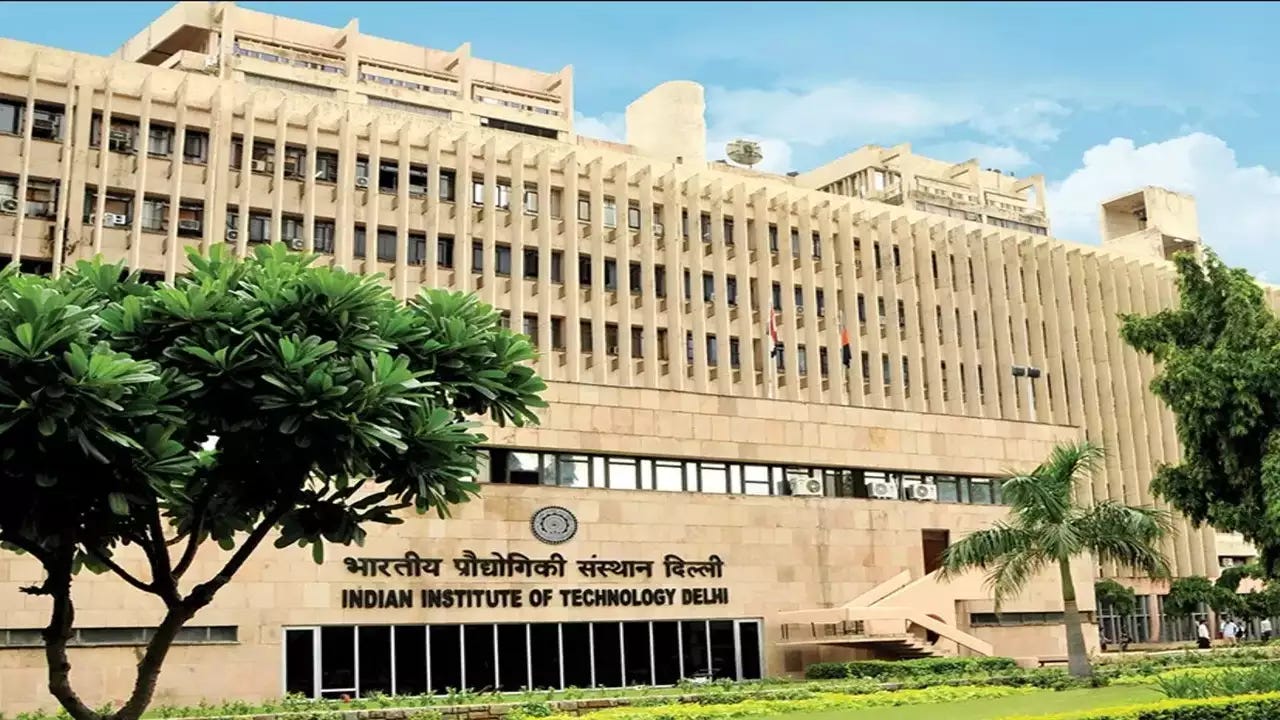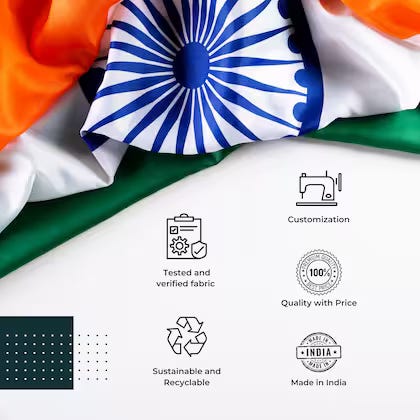eDC Weekly!
eDC IIT Delhi is here with its Independence Day special. We would take you through a journey of how independence has made us more independent in entrepreneurship as well.
India, Independence and Entrepreneurship
On August 15, 1947, India won freedom. It marked a moment when even building up this whole big nation was an experiment, and we didn’t know what the future held. Today, we celebrate the 76th anniversary of India's Independence Day. Over these decades, India has embarked on a remarkable journey of reconstruction, innovation, and advancement.
Amidst this resplendent saga, entrepreneurship has always been a guiding star, illuminating the path towards self-reliance and economic prowess. From the bustling city streets, where dreams of commerce and trade rise high, to the serene landscapes of villages, where artisans weave stories into intricate handicrafts, India's entrepreneurial journey has been a celebration of diversity and tenacity. The land of the Vedas and the birthplace of great civilizations, India's entrepreneurial spirit mirrors the tapestry of its ancient past, where innovation was revered and trade routes spanned the known world.
Today, as we traverse the vibrant corridors of modern India, we witness the rise of startups and visionary leaders, shaping industries and scripting narratives of innovation that reverberate globally. India's tech hubs, its creative hubs, and its ambitious ventures all stand as a testament to the unyielding pursuit of excellence, echoing the very essence of what it means to be an entrepreneur - to dare, to innovate, and to uplift.
In this special edition, we explore the vibrant tapestry of India's entrepreneurial spirit post-independence in a captivating odyssey. Along the way, we uncover two intriguing tales of entrepreneurship: the cooperative revolution of Amul and the innovative prowess of Tonbo Imaging. Furthermore, we are unravelling the impactful potential of government schemes for fostering entrepreneurship.
10x Scaling IIM Bangalore (with eDC):
10xScaling is a special program created by IIM Bangalore and "xto10x," in partnership with eDC, designed to help you achieve remarkable growth in the scaling of startups. Beyond a course, it's a tailored launchpad for visionary leaders. With real-world insights and frameworks from 300+ startups, Binny Bansal's guidance heralds a universe where scaling is an art. Explore stories from successful startup leaders like Rahul Chari (PhonePe), Abhay and Vivek (Licious), and Vidit Aatrey (Meesho). "10xScaling" changes the way you understand scaling and provides a path to becoming an expert in startup growth.
More about this @ → https://info.xto10x.com/scaling
Amul: The Taste Case of India
Amul's story is, rightly, the story of India. In 1946, India was still under British rule. The company named ‘Polson’ had a monopoly over milk processing and distribution, under which farmers were bound to sell milk to the company at arbitrary prices. With inspiration from Sardar Patel, the organisation of Morarji Desai, and under the leadership of Tribhuvandas Patel, farmers established a cooperative named 'Kaira District Co-operative Milk Producers Union Limited' (KDCMPUL) in a village called Anand.t Co-operative Milk Marketing Federation Ltd. and the brand Amul was adopted by GCMFL.
Amul played a significant role in the White Revolution of India, also known as the Operation Flood programme, which transformed India from a milk-deficient nation to one of the largest milk producers in the world, improving the livelihoods of millions of farmers and boosting the country's dairy industry. Amul's impact is far-reaching, showcasing the triumph of cooperative collaboration, technological innovation, and economic empowerment. As the cooperative model flourished, it gave rise to a paradigm of entrepreneurship deeply ingrained in India's socio-economic fabric. Today, the legacy of Amul not only symbolizes the monumental success of the White Revolution but also serves as an enduring source of inspiration for aspiring entrepreneurs across the nation. It exemplifies how a visionary venture can revolutionize an industry, uplift lives, and propel a nation to unprecedented heights.
Here we are with a small breakdown of it all:
The Cooperative Paradigm: Amul, also known as the Gujarat Cooperative Milk Marketing Federation (GCMMF), was founded in 1946 by farmers in Gujarat. It established a cooperative model where small farmers pooled their resources and collaborated to improve milk production, processing, and marketing. This promoted the idea of farmers' cooperatives across the country.
Milk Collection and Processing: Amul set up a well-organized network for milk collection from rural areas. This network facilitated the efficient collection and transportation of milk from small-scale farmers to processing plants.
Technology and Processing: Amul invested in modern dairy technology and processing methods, which helped increase the shelf life of milk and dairy products. This minimised wastage and ensured a regular supply of quality products.
Dairy Infrastructure Development: Amul played a significant role in the establishment of dairy processing plants, cold storage facilities, and other dairy-related infrastructure. This infrastructure development was necessary for handling and processing the increased milk production resulting from the White Revolution.
Economic Empowerment: The success of Amul's cooperative model led to increased income for dairy farmers, which had a positive impact on rural economies. This economic empowerment of farmers aligned with the broader goals of the White Revolution to uplift rural communities.
Fascinated by the story? Have a look at these links!
A Look Into Amul Marketing Strategies: Branding Strategies and Marketing Mix!
Defence Startups: Under the Lens
While startups are usually associated with their commercial aspects, have you ever considered their potential to contribute to national defence issues? Carrying forward the feelings of patriotism we feel on Independence Day; we would love to present before you a startup that is actively working to help boost national security.
Tonbo Imaging is one of the innovative startups that are actively bolstering India's path towards self-reliance, especially in the defence sector. This pioneering company, established by visionary engineers Rahul Trivedi and Ankit Agarwal, originated from the prestigious Indian Institute of Technology, Bombay, reflecting the very essence of Indian innovation.
The thermal imaging cameras developed by Tonbo Imaging have emerged as indispensable assets for our armed forces, being relied upon by the Indian Army, Navy, and Air Force for critical operations, including surveillance, target acquisition, and enhanced night vision capabilities. Beyond their essential role in defence, these cameras find equal importance in law enforcement and other government agencies, showcasing their versatile utility.
What truly sets Tonbo Imaging apart is their proprietary core technology, a genuine testament to Indian inventiveness. By seamlessly integrating high-performance optics, advanced signal processing, and tailor-made electronics, they've engineered thermal imaging cameras that not only outperform their traditional counterparts and stand out for their compactness, portability, and affordability, representing a remarkable engineering achievement.
The Indian government acknowledges the pivotal role played by startups like Tonbo Imaging, extending substantial support that aligns seamlessly with the nation's aspirations for defence modernization. Having secured over $10 million in funding from esteemed investors such as Sequoia Capital India and Qualcomm Ventures, Tonbo Imaging is a shining example, proving that Indian innovation has the potential to lead the way in technology.
This Independence Day, let's extend our salute to Tonbo Imaging and the numerous other outstanding startups diligently working towards making India self-reliant in the defence sector. They embody the very spirit of innovation, resilience, and determination that will define the trajectory of our nation's defence capabilities, marking a significant milestone in India's progressive journey towards an “Aatmanirbhar Bharat.”
As we celebrate our nation's independence, let us acknowledge not only the valorous efforts of our defense forces but also the trailblazing contributions of these innovative defense startups. By supporting and nurturing this ecosystem, India not only strengthens its self-reliance but also creates avenues for economic growth and technological prowess.
This YouTube video below takes a look at India’s defence startup system and shows the growth of this Indian industry in recent times!
Empowering Entrepreneurship: Navigating India's Flourishing Business Landscape
Do you think starting a startup is a daunting task? Not necessarily, especially when you consider the multitude of available resources to aid you. We're here to demystify and provide you with the tools to harness government schemes, facilitating the growth of your business.
The world of MSMEs (Micro, Small, and Medium Enterprises) is evolving, and India's government schemes are lighting the path for entrepreneurs. From financial support to global opportunities, these schemes blend innovation with streamlined regulations, creating an environment ripe for business growth.
Learn more about MSME opportunities:
Startup India:
Dive into the innovation odyssey supported by the government through "Startup India." This transformative initiative is your ticket to unlocking mentorship, funding, and growth incentives.
Learn more at:
https://www.startupindia.gov.in/content/sih/en/about-startup-india-initiative.html
IIT Delhi student?
IIT Delhi boasts a legacy of nurturing groundbreaking startups. Are you an aspiring entrepreneur within its hallowed halls? Here's a peek into some game-changing schemes waiting to fuel your innovation:
Government initiatives like the "Atal Innovation Mission" and "Smart India Hackathon" are catalysts for funding, mentorship, and skill development.
Deferred placement is an option provided by IIT Delhi that allows students to defer their on-campus placement and work on their startup venture instead. If the startup doesn't succeed, students can choose to return and sit for placements within the next two years. This programme is available to all eligible students, irrespective of their branch or academic performance. This option allows students to pursue their entrepreneurial aspirations while still having the safety net of returning to the traditional placement process if needed.
You can read more about these at the following links:
https://www.aim.gov.in/
https://www.sih.gov.in/
https://fitt-iitd.in/web/government-program (must read for the students)
Unfurling IIT Delhi's Patriotism: SWATRIC'S Flag of Triumph!
Amidst soaring nationalism this Independence Day, the IIT-Delhi campus proudly boasts the monumental 108-ft national flag at Himadri Circle, a paragon of patriotism, unity, and technological prowess. Crafted by IIT-Delhi's startup SWATRIC, this colossal Tiranga symbolizes our nation's spirit and engineering prowess. Guided by Professor Bipin Kumar, the flag boasts 30% less weight yet stronger seams, a triumph of Indian innovation. SWATRIC's saga extends to designing fabric flags across India, led by CEO Ranu Khade and Professor Bipin Kumar. A blend of technology and tradition, this legacy endures diverse climates, embodying India's unyielding spirit. As we celebrate, gaze not only at the skies but also at this IIT Delhi masterpiece—a tapestry of innovation and patriotism, reminding us of India's soaring resilience
TEDx Talks; Nurturing India's Village Entrepreneurial Oasis
Manav Subodh envisions India as a Silicon Valley for rural entrepreneurs, uniting inclusivity and triumph in his compelling TED Talk. From 200+ villages, he sparks a movement, redefining entrepreneurship and urging audacious dreams for a thriving India. Watch the full video below:
If you have any suggestions or feedback for us, we would love to hear from you in the comments.









